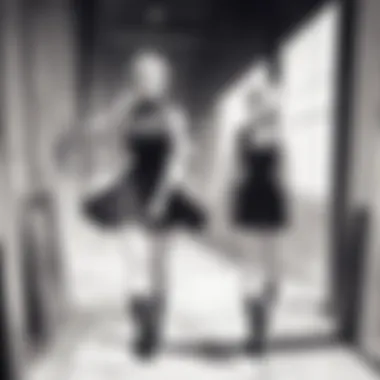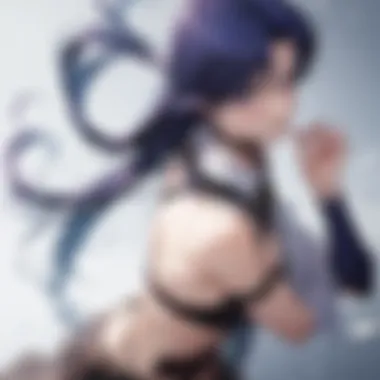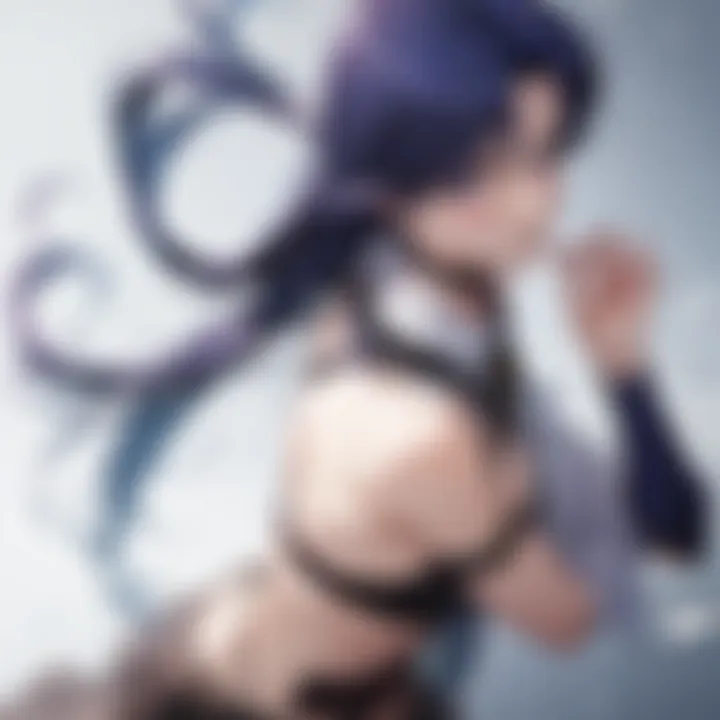An In-Depth Examination of Fullmetal Alchemist Brotherhood


Intro
'Fullmetal Alchemist: Brotherhood' is more than just an anime; it is a meticulously crafted narrative that invites viewers to engage with complex characters and deep themes. Understanding this series provides insights into various human conditions like sacrifice, ambition, and morality. As we dive into the intricacies of this work, we will explore character development, thematic depth, and the cultural significance it holds.
Character Analysis
Overview of Character Development
In 'Fullmetal Alchemist: Brotherhood', character development is paramount. The series showcases the transformation of its main characters, particularly Edward and Alphonse Elric. These brothers undergo significant growth shaped by their past decisions and the harsh realities they face. Edward, often driven by pride and a deep sense of responsibility, evolves into a more self-aware individual. His journey challenges his initial beliefs and ideals.
Alphonse, although physically disadvantaged by his transformation into a suit of armor, exhibits emotional strength and wisdom. His unwavering support for Edward highlights his integral role in the story. Together, their relationship is a testament to the strong familial bonds that persist despite adversity.
In addition to the Elric brothers, many supporting characters are also well-developed. Roy Mustang, with his ambitious nature, represents the darker aspects of power. His character arc reflects the moral ambiguities present within the military and its sacrifice for personal gain.
Key Relationships and Dynamics
The narrative intricately weaves relationships among characters, creating a rich tapestry of interactions. Notable dynamics include:
- Edward and Alphonse Elric: Their brotherly bond is central to the plot. Their loyalty to each other propels the story forward.
- Roy Mustang and Riza Hawkeye: Their relationship embodies trust and sacrifice, showcasing loyalty in a perilous environment.
- Scar and the Elric Brothers: Scar's initial antagonism towards the brothers complicates traditional notions of good and evil, revealing the grey areas in conflict.
These relationships add layers to the character's motivations, making them relatable and compelling.
Thematic Exploration
Central Themes and Messages
The themes in 'Fullmetal Alchemist: Brotherhood' are profound. Key themes include:
- The Cost of Ambition: The pursuit of knowledge often carries severe consequences, as seen with the Elric brothers' tragic past.
- Sacrifice: The series addresses what individuals are willing to sacrifice for those they love and for their own goals.
- Redemption: Several characters seek redemption for their past mistakes, illustrating the importance of acknowledging one's actions.
Cultural Context and Influences
The cultural influences in 'Fullmetal Alchemist: Brotherhood' extend beyond typical shōnen tropes. The series draws on concepts from Western alchemy, exploring how these ideas inform philosophical discussions about creation and destruction. The impact of World War II is also prevalent, influencing aspects of character motivations and narrative conflicts. In essence, this blend of influences enriches the viewing experience, making it both culturally significant and timeless.
"Fullmetal Alchemist: Brotherhood is not just a tale of fantasy; it is a reflective examination of human existence and moral conduct."
This analysis of character development and thematic elements underscores the richness of 'Fullmetal Alchemist: Brotherhood'. By examining these aspects, we recognize the depth that elevates this series beyond conventional storytelling, appealing to both casual viewers and dedicated fans.
Preface to Fullmetal Alchemist: Brotherhood
Fullmetal Alchemist: Brotherhood stands as a monumental piece of storytelling within the anime and manga landscapes. From its inception, it has captured the attention of audiences worldwide. This interest arises not only from its engaging plot but also from the profound themes it explores. At the heart of the narrative are the philosophical inquiries into life, death, and the morals surrounding human ambition.
One central aspect of this series is its intricate narrative structure, which weaves together personal conflict, action, and ethical dilemmas. The story of two brothers—Edward and Alphonse Elric—serves as a lens through which viewers can explore complex ideas such as sacrifice, the value of human life, and the consequences of one's actions. Through the Elric brothers' journey, the series challenges its audience to reflect on their own choices and beliefs.
Key Elements in the Prologue
- Narrative Depth: The series combines multiple elements that are characteristic of both shonen and seinen genres, appealing to a broad spectrum of viewers.
- Character Development: Each character presents unique conflicts and growth arcs, posing moral questions that elevate the storyline.
- Philosophical Undertones: Fullmetal Alchemist: Brotherhood delves deeper than merely entertaining; it invites introspection on existential themes, making it relevant in both anime culture and philosophical discourse.
The relevance of exploring this series cannot be overstated. It bridges the gap between casual viewing and critical analysis, allowing fans to appreciate the storytelling craft more intricately. Additionally, the ongoing discussions around the series in forums like Reddit demonstrate its lasting impact and the community's desire to unpack its various dimensions, from character arcs to ethical dilemmas. Through this exploration, both newcomers and seasoned fans of anime can uncover layers of meaning that enrich their viewing experience.
"Fullmetal Alchemist: Brotherhood challenges us to look at the consequences of our actions and the true meaning of sacrifice."
In summarizing the significance of Fullmetal Alchemist: Brotherhood, it becomes clear that this series is much more than entertainment—it serves as a profound commentary on the human condition, making it an essential subject of study for any serious anime or manga enthusiast.
Historical Context and Origins
The historical context and origins of Fullmetal Alchemist: Brotherhood provide significant insights into the series' creation and the underlying themes that permeate it. Understanding this context enriches the viewer's experience and enhances appreciation for the intricate storytelling involved. This section will explore the intricate developments that contributed to the series' formation and its differences from earlier adaptations. Furthermore, it will heighten awareness of the cultural influences and historical significances that inform its narrative structure.
Creation and Development
Fullmetal Alchemist: Brotherhood emerged as a product of collective creativity and a desire to accurately represent the vision of its original manga artist, Hiromu Arakawa. The anime first aired in 2009, produced by the studio Bones, known for its high-quality animation and complex storylines. The series is a faithful adaptation of the manga, which began serialization in 2001 in Square Enix's Monthly Shōnen Gangan magazine.
The real success can be attributed to the blend of Arakawa's storytelling and the inventive suggestions from the production teams. Original Fullmetal Alchemist anime, which aired from 2003 to 2004, diverged significantly from the manga's plot due to its premature conclusion. However, Brotherhood sought to rectify this by strictly adhering to the manga’s narrative arc, ensuring an accurate and comprehensive depiction of the characters and their journeys.
As a result of these concerted efforts, the series managed to capture a more cohesive narrative while retaining the serous themes of sacrifice, ethics, and the consequences of human actions. This reflection of human complexity is further enhanced by Arakawa's skillful character development, which resonated well with audiences, a testament to the foundational importance of this creation phase.
Manga vs. Anime Adaptations


The distinction between the manga and the anime adaptations reveals not only differences in plot but also a shift in thematic resonance. The original manga's storyline allows for a deeper exploration of character motivations and philosophical dilemmas. In contrast, the first anime adaptation had to borrow themes and plotlines to fill gaps left by the unfinished manga, leading to a narrative that often conflicted with Arakawa’s intent.
Fullmetal Alchemist: Brotherhood presents a narrative that fully explores:
- Character relationships: The bond between Edward and Alphonse Elric is central and explored adequately in the manga.
- Historical influences: Themes of war, ethics, and human ambition are portrayed with rich subtlety in Brotherhood, reflecting real-world counterparts.
- Alchemy's philosophical basis: Brotherhood delves into the ethical implications of alchemy, leading to critical moral questions about what it means to sacrifice for greater good.
Thus, the adaptation decisions have crucial implications for the audience's understanding and interpretation of underlying messages. By returning to the original source material, Brotherhood shines a light on the profound storytelling Arakawa crafted.
"The gap between desire and reality forms the core of the tragedy that reoccurs in Fullmetal Alchemist: Brotherhood."
In summary, the inception of Fullmetal Alchemist: Brotherhood and its position within this historical and cultural context play an essential role in understanding its impact on viewers and appreciate its depth. Familiarity with these elements facilitates a more nuanced discussion regarding both the series' artistry and its storytelling prowess.
Narrative Structure
In the context of Fullmetal Alchemist: Brotherhood, the narrative structure is not merely a framework; it serves as a vital element that enhances the overall experience of the series. It facilitates the progression of themes, develops characters, and intricately weaves plot points that resonate with the audience. A well-crafted narrative structure allows for sophisticated storytelling that invites viewers to engage with complex moral dilemmas while encouraging them to reflect on the underlying philosophies presented.
The significance of the narrative structure in this anime cannot be overstated. It encompasses various storytelling techniques, including pacing, character arcs, and thematic exploration, which all work in concert to deliver a compelling narrative. Analyzing these elements provides insight into how the storytelling techniques employed contribute to the richness of the series and its lasting impact on both anime and manga enthusiasts.
Plot Overview
Fullmetal Alchemist: Brotherhood follows the journey of two brothers, Edward and Alphonse Elric. After a failed alchemical experiment to resurrect their deceased mother, they lose parts of their bodies. Edward sacrifices his arm; Alphonse loses his entire body, which forces his soul to reside in a suit of armor. Their quest for redemption leads them to seek the Philosopher's Stone, which can amplify their alchemical abilities and help them regain what they lost. This pursuit is not just a physical journey but also a profound search for knowledge and understanding.
Throughout the series, the narrative unfolds in a linear yet intricately layered manner. It intertwines various character story arcs with the central theme of sacrifice and the consequences of ambition. Each episode builds upon the last, expanding the world and introducing the audience to numerous factions and ideologies that shape the characters' experiences.
The plot effectively balances moments of action, drama, and philosophical reflection, making it both entertaining and thought-provoking. This blend ensures that the audience stays engaged and invested in the characters' quest and the dilemmas they face.
Pacing and Story Arcs
Pacing is another critical aspect of the narrative structure in Fullmetal Alchemist: Brotherhood. The series skillfully manages its tempo, alternating between fast-paced action sequences and slower, more reflective moments of character development.
The story arcs are structured to provide impactful developments while maintaining cohesion. Individual arcs often revolve around significant conflicts, such as the brothers’ confrontations with the Homunculi and internal struggles with their past choices. This results in a satisfying buildup of tension that culminates in emotional and narrative payoffs.
The pacing is also essential for allowing themes to develop organically. The series presents moral questions through its characters’ challenges, giving viewers time to absorb and contemplate the implications of decisions made throughout their journey.
Character Analysis
In the examination of Fullmetal Alchemist: Brotherhood, character analysis serves as a vital component. The series showcases a compelling array of characters that drive the plot and embody its themes. Understanding each character allows viewers to grasp the moral dilemmas they face, and the growth they experience over time. This analysis looks into the complexities of relationships, motivations, and the philosophical undertones that shape these characters. Readers will gain insights into how the characters contribute to the overarching narrative and themes present in the series.
Edward Elric
Edward Elric is the central figure in Fullmetal Alchemist: Brotherhood. His journey, marked by ambition and deep regret, illustrates the consequences of knowledge and power. Edward, often referred to as "Ed," is driven by the desire to restore his brother Alphonse's body after a failed alchemical experiment. This event sets the stage for the exploration of equivalent exchange, a central tenet in the series. Edward is characterized by his stubbornness and unwavering determination, which make him both relatable and inspirational.
Importantly, Edward’s relationships, especially with Alphonse and other characters, showcase the theme of sacrifice. As the series progresses, his character evolves, revealing deeper layers of vulnerability and resilience. Thus, Edward serves not only as a protagonist but as a vehicle for exploring themes of redemption and the weight of loss.
Alphonse Elric
Alphonse Elric, the younger brother of Edward, embodies the innocence and curiosity that often juxtaposes Ed's intensity. After the accident that leads to the loss of his physical body, Alphonse's character is a manifestation of both hope and a tragedy. Encased in a suit of armor, he faces existential questions about identity and humanity. Alphonse's gentle nature and profound empathy contrast sharply with the harsh realities of the world around him.
Unlike Edward, who often burdens himself with guilt, Alphonse tends to exhibit a more forgiving outlook. His unwavering belief in the goodness of others acts as a moral compass, steering Edward toward more constructive choices. Alphonse’s character adds emotional depth to the narrative, as his struggles with his own existence illuminate the consequences of their actions, reinforcing the series' overarching themes of life and loss.
Supporting Characters
Supporting characters in Fullmetal Alchemist: Brotherhood are indispensable in enriching the narrative. They bring diverse perspectives that complement or challenge the main characters. Among these, Roy Mustang, the Wardens of the Amestris Military, and the Homunculi stand out for their unique attributes and contributions.
Roy Mustang
Roy Mustang is often recognized for his complexity as a military officer and a powerful alchemist. His character when examined closely, reveals the conflicts of his ambition and ethical responsibilities. He strives for higher office primarily to implement change within the military. This ambition complicates his relationships with others, especially with Edward and his team.
Mustang is characterized by his intelligence and charisma, making him a compelling leader. His unique ability to manipulate fire through alchemy makes him a formidable force. Yet, his struggle against corruption within the military highlights the moral complexities present in leadership roles. Thus, Mustang represents the tensions between personal ambition and moral integrity, making him an essential part of the narrative fabric.
Wardens of the Amestris Military
The Wardens of the Amestris Military represent a blend of governance, power, and the systemic issues present in the military structure. Each warden brings a distinctive perspective to the narrative, often acting as agents of both order and chaos. Their presence reinforces themes of loyalty and obedience, challenging the ideals of justice that many characters strive for.
This group is characterized by their contrasting beliefs about the use of alchemy and authority. Their actions influence the course of the story, serving as obstacles or catalysts for the protagonists. In their complexity, the Wardens exemplify the intricate relationship between power and moral responsibility.
Homunculi


The Homunculi are essential antagonists within the series, embodying the darker facets of alchemy. Each Homunculus represents a sin, such as Lust or Greed, adding a moral dimension that complements the protagonists’ struggles. Their existence raises critical questions about identity and humanity, as they were created through alchemical means.
They are characterized by their unique abilities and manipulative nature. Their interactions with the main characters often reveal deeper layers of conflict and moral ambiguity. The Homunculi represent not only villains but also reflections of the characters’ own flaws and desires, enhancing the narrative's thematic explorations.
Overall, these supporting characters play crucial roles in shaping the story, ensuring that themes of morality, power, and consequence are examined from multiple angles. Their depth adds richness to the narrative and keeps viewers engaged throughout the series.
Thematic Exploration
The thematic exploration within Fullmetal Alchemist: Brotherhood is crucial for understanding its depth and complexity. The series does not merely present a fantastical narrative of alchemy and adventure; it delves into profound moral and philosophical questions. Each theme is interwoven with character struggles and broader societal implications, making the story resonate on multiple levels. The exploration of sacrifice, consequences, death, redemption, and forgiveness lays bare the human condition in a world filled with extraordinary powers and choices. These themes enhance the narrative and offer viewers a thoughtful reflection on their values and beliefs.
Sacrifice and Consequence
Sacrifice and consequence form a central pillar of the storyline in Fullmetal Alchemist: Brotherhood. Characters repeatedly face dilemmas where they must weigh the cost of their ambitions against the potential fallout. Edward Elric’s journey is driven by the sacrifices he and his brother, Alphonse, make to achieve their ultimate goal of restoring their bodies. Their quest underscores the theme that all actions carry consequences, emphasizing that even noble intentions can lead to devastating outcomes.
This theme resonates especially well within the cultural context of the series. The use of alchemy as a metaphor for personal sacrifice highlights the struggles faced by individuals within society. For instance, the characters grapple with the reality that every gain comes at a price, encapsulated in the principle of equivalent exchange. This depiction serves as a candid commentary on human relationships and moral responsibilities.
"The most important thing in life is to find that balance between what one wants and what one is willing to give up to achieve it."
Inevitability of Death
The inevitability of death is a recurring motif throughout the series, influencing character motivations and the overall narrative arc. This theme emphasizes that life is temporary, and the fear of death can drive individuals to make irrational or morally questionable decisions. Characters like Scar and Father highlight how the threat of mortality can lead to obsessive desires for power and revenge.
By confronting death directly, the series provokes reflections on how one chooses to live. The Elric brothers’ journey is not just about overcoming physical limitations but also about coming to terms with loss and mortality. The acceptance of death leads to stronger character development and a more profound appreciation of life itself. In many ways, facing death challenges them to pursue a deeper understanding of what it means to be human, making this theme salient.
Redemption and Forgiveness
Redemption and forgiveness are pivotal themes that permeate the fabric of Fullmetal Alchemist: Brotherhood. The characters’ paths often intersect with the need for redemption, challenging them to confront their past actions. This theme is particularly evident in figures like Roy Mustang and Envy, whose arcs explore the potential for change and the possibility of forgiveness.
The series suggests that forgiveness is not just about absolution, but also about self-acceptance and growth. Characters must confront their own misdeeds and the impact those have had on others. For Edward and Alphonse, understanding that mistakes are part of the human experience enables them to seek forgiveness while also learning to forgive themselves. This process of redemption fosters a hopeful message: no matter how deep the scars of the past, there is always a path toward healing.
Philosophical Underpinnings of Alchemy
Alchemy in Fullmetal Alchemist: Brotherhood is more than just a mystical science; it is a philosophical framework that informs the characters’ motivations and the story's progression. The series intricately weaves fundamental themes of sacrifice, morality, and consequence through its exploration of alchemy, creating a rich tapestry that elevates the narrative.
Understanding these philosophical underpinnings enhances our appreciation of the series. At its core, alchemy reflects a quest for knowledge and the inherent trade-offs that accompany such pursuits. The principles that govern alchemy serve as a mirror to the characters’ experiences, revealing their desires, regrets, and moral dilemmas.
The Principles of Equivalent Exchange
One of the central tenets of alchemy presented in the series is the principle of Equivalent Exchange. This principle posits that nothing can be gained without giving something of equal value in return. This is not just a adage for the alchemists; it is a profound philosophical statement about the nature of life decisions and the weight of consequences.
In a practical sense, this means that the characters who use alchemy must carefully consider what they are willing to sacrifice. For instance, Edward and Alphonse Elric's tragic fate stems from their desperate attempt to resurrect their mother, an act driven by grief and love. The series illustrates that their profound loss does not come without a hefty price, which is ultimately their own bodies. This stark reality is a grim reminder that every action has a counteraction, a recurring motif throughout the narrative.
Alchemy as a Metaphor
Alchemy also serves as a metaphor for personal growth and transformation. Its principles are reflected in the characters' journeys, emphasizing that true change often requires sacrifice. Throughout Fullmetal Alchemist: Brotherhood, we see characters wrestling with their flawed pasts and striving toward redemption.
The act of transmutation, an act that alchemists perform, symbolizes not just physical transformation but also the emotional and psychological changes the characters undergo. For example, characters like Roy Mustang grapple with notions of power and responsibility, illustrating that the pursuit of greater goals can lead to ethical complexity.
“Man’s mind, once stretched by a new experience, can never go back to its old dimensions.”
In this context, alchemy becomes a powerful symbol of evolution—both personal and societal. The series suggests that as one navigates life's challenges, the process of alchemy can be seen as a metaphor for the inner transformations that individuals must undergo.
In summary, the philosophical underpinnings of alchemy in Fullmetal Alchemist: Brotherhood provide a depth that enhances the viewing experience. The principles of Equivalent Exchange and the metaphorical aspects of alchemy reflect both the characters’ struggles and the series’ broader themes, making it a rich field of study for enthusiasts and scholars alike.
Cultural Impact and Reception
The cultural impact and reception of Fullmetal Alchemist: Brotherhood are significant components in assessing its success and relevance. This anime series does not just entertain; it has also sparked discussions around moral philosophy, ethics, and the impact of choices. Many viewers find themselves reflecting on their own lives through the trials faced by the characters. The thematic richness combined with a well-structured narrative forms a profound cultural footprint.
Audience Reviews and Critiques
The audience response to Fullmetal Alchemist: Brotherhood has been overwhelmingly positive. On platforms like Reddit and anime forums, fans express admiration for its storytelling and depth. Many reviewers praise the well-rounded characters, particularly Edward and Alphonse Elric. Their journey is often seen as relatable, adding layers to the viewing experience.
Critiques, albeit fewer, typically point out the pacing in certain parts. While some fans argue that every episode serves a purpose, others feel that certain arcs could have been developed further. Nevertheless, the show's commitment to intricate character development tends to overshadow these critiques. Overall, the series has cultivated a dedicated fan base that appreciates its nuanced approach to storytelling.
Here are key points mentioned in audience feedback:
- Strong Character Development: Viewers connect deeply with character arcs.
- Philosophical Themes: Many revel in the exploration of complex issues like sacrifice and redemption.
- High Production Value: The animation quality and voice acting receive consistent praise.


Awards and Recognitions
Fullmetal Alchemist: Brotherhood has not only impressed audiences but has also garnered various accolades over the years. It has won several awards that cement its place in anime history. These include prestigious recognitions from the Tokyo Anime Award Festival and the Anime Expo, among others.
The series is frequently cited in lists of the greatest anime of all time, often ranking near the top. Its impact extends to international audiences, as evidenced by positive reception in countries like the United States and those across Europe. Here are some notable achievements:
- Tokyo Anime Award for Best TV Animation
- Anime of the Year by multiple anime magazines
- Recognition for Best Director and Animation Excellence
Ultimately, the cultural impact and reception of Fullmetal Alchemist: Brotherhood highlight its significance within the anime community. The series rarely goes unmentioned in discussions about outstanding anime, displaying themes and character depth that resonate with diverse audiences.
Comparative Analysis with Other Anime
The comparative analysis with other anime is a crucial element in understanding the broader impact and significance of Fullmetal Alchemist: Brotherhood. By contrasting this series with both its predecessor and other works in the genre, one gains insights into its unique contributions to storytelling, character development, and thematic exploration. This section will illuminate the strengths and weaknesses inherent in Brotherhood while situating it within the larger anime landscape. Such analysis not only highlights the merits of Fullmetal Alchemist: Brotherhood but also allows for a richer appreciation of how it aligns with or diverges from common tropes in anime.
Comparison with Original Fullmetal Alchemist
The original Fullmetal Alchemist, which aired in 2003, took a different narrative direction compared to Fullmetal Alchemist: Brotherhood. It initially followed the manga's storyline but soon diverged significantly to create an independent plot. This shift is pivotal for understanding the evolution of the characters and themes presented in both adaptations.
Fullmetal Alchemist: Brotherhood, released in 2009, adheres more faithfully to Hiromu Arakawa's original manga. The intricacies of the plot in Brotherhood emphasize the complexities of alchemy, the moral dilemmas faced by the characters, and the significant theme of sacrifice. In contrast, the earlier version created a conclusion that, while impactful, did not fully reflect the manga's depth and philosophical questions.
Some key differences include:
- Consistency in Storytelling: Brotherhood presents a more cohesive narrative that explores character arcs deeply and aligns with the original manga’s themes.
- Character Development: Characters in Brotherhood are often more nuanced, with conflicts that resonate with the principle of equivalent exchange and its consequences.
- Thematic Depth: Brotherhood delves deeply into issues like the repercussions of ambition and the moral complexities tied to alchemy, in a way that the original did not.
Similar Series and Themes
When comparing Fullmetal Alchemist: Brotherhood to similar series, certain themes emerge consistently across the genre. Titles such as Attack on Titan, My Hero Academia, and Demon Slayer often explore themes of sacrifice, morality, and the struggle against societal expectations.
Other series also deal with the cost of power and the journey of self-discovery. For example:
- Attack on Titan: Like Brotherhood, it raises ethical questions regarding freedom and the price of achieving one's goals.
- Naruto: Focuses on the journey of its characters toward redemption, mirroring Edward and Alphonse's quest for forgiveness and understanding.
- Demon Slayer: Shares the theme of confronting loss and trauma, paralleling the brothers' journey through their personal and collective struggles.
The similarity in themes allows for richer discussions among fans and provides a deeper understanding of how Fullmetal Alchemist: Brotherhood fits into the larger conversation about morality and growth within anime.
Visual and Artistic Style
In the realm of anime, the Visual and Artistic Style serves as a critical framework that shapes the audience's perception and engagement. In Fullmetal Alchemist: Brotherhood, the artistry is not merely aesthetic. It plays a vital role in enhancing the storytelling, character development, and thematic essence of the series. The visual elements contribute layers of meaning that resonate well with the audience, making the narrative more impactful and immersive.
Animation Techniques
One of the standout features of Fullmetal Alchemist: Brotherhood is its animation quality. The series employs a seamless blend of traditional animation and modern techniques. The fluid movement of characters, especially during intense action sequences, reflects meticulous planning and execution by the animation team. This attention to detail is vital as it elevates the emotional stakes. For instance, during battle scenes, the speed and dynamism of movements draw viewers into the conflict, allowing a deeper connection to the characters’ struggles.
Additionally, the use of color plays a significant role in evoking mood and atmosphere. For example, darker tones are often used during moments of despair or conflict, while brighter shades highlight themes of hope and determination. This careful choice of color schemes augments the viewers' emotional experience. The integration of CGI in some instances further enhances depth without overshadowing the art style, maintaining a consistent and engaging aesthetic throughout.
Character and Background Design
The character and background design in Fullmetal Alchemist: Brotherhood stands out for its distinctiveness and complexity. Characters are designed not only with unique appearances but with expressive features that convey their personality and emotions. Edward Elric's signature automail arm is emblematic of his journey and struggles, while Alphonse's armor signifies vulnerability masked by strength.
Backgrounds also play an integral role, as they are richly detailed and serve to complement the narrative. Locations within the world of Amestris are thoughtfully crafted, ranging from bustling cities to desolate landscapes, each reflecting the thematic elements at play. Such settings provide context and grounding to the characters' narratives.
Moreover, character design reflects the series' thematic explorations. The various homunculi, for example, are designed to visually embody the sins they represent. This connection between character design and thematic substance deepens the viewers’ understanding of the moral and ethical dilemmas presented in the storyline.
"The distinct visual style allows Fullmetal Alchemist: Brotherhood to convey complex themes in an accessible manner. It is an art form that not only tells a story but makes it resonate on an emotional level."
In summary, the visual and artistic style of Fullmetal Alchemist: Brotherhood is instrumental in crafting a narrative that is both engaging and profound. The attention to animation techniques and thoughtful character and background designs combine to create a series that is visually striking and thematically rich.
The End
The conclusion serves as a vital element in any comprehensive analysis, providing the opportunity to encapsulate and reflect on the extensive discussions presented in the article. In this case, the culmination of thoughts on Fullmetal Alchemist: Brotherhood emphasizes the importance of its narratives, characters, and themes. Each element meticulously unfolds a broader understanding of human experience, morality, and the consequences of one's actions.
Legacy of Fullmetal Alchemist: Brotherhood
Fullmetal Alchemist: Brotherhood has established itself as a significant cultural artifact within the anime and manga community. Its exploration of deeply philosophical themes resonates with audiences, prompting both critical and emotional responses. The series succeeded in not only entertaining but also in encouraging reflection on complex concepts such as sacrifice, redemption, and the moral implications of scientific pursuit.
Key points about its legacy include:
- The narrative’s depth draws viewers beyond surface-level enjoyment, inviting them to engage with the inherent moral quandaries faced by its characters.
- The character arcs, particularly those of Edward and Alphonse Elric, demonstrate growth through adversity, leaving lasting memories on the audience.
- Critical acclaim has translated into numerous awards, highlighting its artistic and narrative strengths.
Overall, the series has earned a place in both anime history and general pop culture, inspiring various works and discussions long after its conclusion.
Final Thoughts
As we delve into Fullmetal Alchemist: Brotherhood, it becomes clear that the series offers an extraordinary blend of action, philosophy, and emotional depth. This combination appeals to a wide spectrum of viewers, securing its relevance even years after its release. The themes presented not only entertain but also impart valuable lessons about humanity and morality.
In summary, the significance of examining this anime lies in its enduring ability to provoke thought. It encourages viewers to contemplate their own lives and values, ultimately prompting a journey of self-discovery and understanding. Whether you are a seasoned fan or a newcomer, the insights gained from this examination deepen appreciation for Fullmetal Alchemist: Brotherhood, solidifying its status as a timeless work in the realm of anime.















